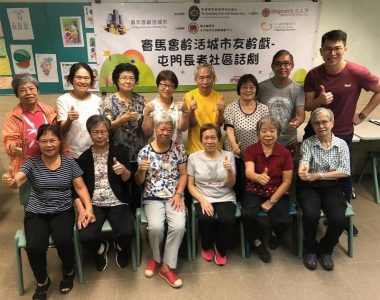Jockey Club Age-friendly City Project – Tuen Mun District



To enhance the older people’s quality of life and build an age-friendly city which can cater to the needs of people of all ages, the Hong Kong Jockey Club Charities Trust (the “Trust”) funded Asia-Pacific Institute of Ageing Study (APIAS), Lingnan University and three non-governmental organisations (NGOs), namely the Yau On Lutheran Centre For The Elderly (路德會友安長者中心), The Neighborhood Advice-Action Council (鄰舍輔導會), Yan Oi Tong Wu Chong District Elderly Community Centre (仁愛堂胡忠長者地區中心), to implement four district-based programmes in 2019.
According to the findings of baseline assessment and the evaluation of the first batch district-based programmes conducted in 2017 and 2018 respectively, “Social participation” and “Respect and social inclusion” were given the higher priority for improvement by the second batch district-based programmes implemented in 2019.
The NGOs mobilized older people as voluntary ambassadors and promote the concept of Age-Friendly City via a variety of activities, including art performance, skills-based training on smart phone and related application, body checks, health-related promotion and public education, intergenerational activities, outreach services to elderly living in rural areas etc. Over 8,591 residents have benefited directly from these programmes while more than 14,896 residents have indirect benefits.
Main target group: Both younger and older people (i.e. intergenerational)
Sector(s): Education, Health, Information and communication
Desired outcome for older people:
Meet their basic needs